The striking off and suspension of several civil society organizations (CSOs) by the Burundian government causes fear for the regime and doubt about its governance.
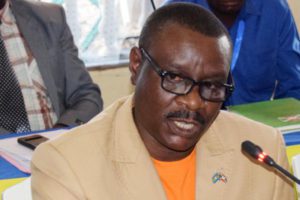
Térence Ntahiraja “These suspended organizations have clandestinely continued to perform despicable acts likely to disrupt the country’s safety.”
“… The above associations have deviated from their goals set in their statutes and are rather busy tarnishing the country’s image and stirring up hatred and division among the people of Burundi.” This is the sledgehammer argument advanced by the Ministry of Interior and patriotic training in an ordinance announcing the measure. On the 19th, October 2016, Pascal Barandagiye, the Interior Minister, struck off definitively five CSOs by Ordinance No.
530/1922. The latter are the Forum for the Strengthening of Civil Society (FORSC), FOCODE (the Forum for awareness and development), APRODH (Burundi Association for the Protection of Human Rights and Detained Persons), ACAT (Christian Action for the Abolition of Torture) and ROE (Network of Honest Citizens). The common ground for these organizations is that they were members of the campaign”Halt to the Third Term of Pierre Nkurunziza.” They were suspended on 23 November 2015. All the leaders of these organizations have been active in the movement to stop the third term of President Nkurunziza, and some are subject to an international arrest warrant issued by the Burundian justice. Some of these organizations continue to produce regular reports on violations of human rights in Burundi.
From suspension to the striking off …
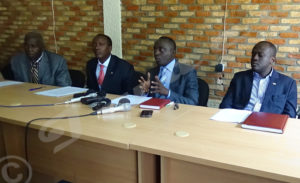 On 24 October, another ordinance N ° 530/1960 by the same minister suspends temporarily five CSOs: COSOME (Coalition of Civil Society for Election Monitoring), CB-ICC (Burundian Coalition for ICC) UBJ (Union of Burundian Journalists), “Iteka” Burundian League for Human Rights, and Burundi SOS Torture. Barandagiye accused them of “carrying out activities that are not in accordance with their goals set out in their statutes and which are likely to disrupt the order and security of the state.” The ordinance does not specify the duration of the suspension.
On 24 October, another ordinance N ° 530/1960 by the same minister suspends temporarily five CSOs: COSOME (Coalition of Civil Society for Election Monitoring), CB-ICC (Burundian Coalition for ICC) UBJ (Union of Burundian Journalists), “Iteka” Burundian League for Human Rights, and Burundi SOS Torture. Barandagiye accused them of “carrying out activities that are not in accordance with their goals set out in their statutes and which are likely to disrupt the order and security of the state.” The ordinance does not specify the duration of the suspension.
“These five organizations have secretly continued to perform despicable acts likely to disrupt the country’s safety instead of respecting the law and their suspension. They have allied with other associations, worked in secret and prepared documents that tarnish the image of the country, the reason why His Excellency the Minister of Interior has released an ordinance on 19 October, 2016 that strikes off five organizations, “said Térence Ntahiraja, Assistant to the Interior Minister. These organizations, he added, formed a coalition with five others which were not suspended namely COSOME, CB-CPI, UBJ, Iteka league and SOS torture Burundi, “what is dramatic. ”
Reactions
Armel Niyongere: “A non-event!”
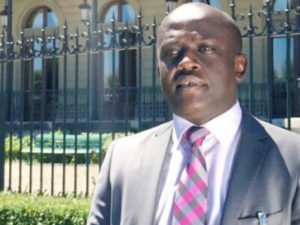 “The cancellation of our association is a non-event. Even though the de facto regime did everything to block us, our fight against impunity continues, “reacted quickly on twitter Armel Niyongere, president of ACAT. Niyongere talks of unfounded accusations: “All this is linked to our commitment to the fight against impunity, the monitoring of human rights violations, advocacy at international level and the reports that we publish.” For him, this announcement strengthens their determination. He also points out that these organizations have been suspended for over a year, but this did not prevent them from continuing to work. “We changed the strategy during the crisis. The regime forgets that we work in collaboration with state actors (police, army, Intelligence service, public administration, judiciary…). They are the ones who give us verified information”
“The cancellation of our association is a non-event. Even though the de facto regime did everything to block us, our fight against impunity continues, “reacted quickly on twitter Armel Niyongere, president of ACAT. Niyongere talks of unfounded accusations: “All this is linked to our commitment to the fight against impunity, the monitoring of human rights violations, advocacy at international level and the reports that we publish.” For him, this announcement strengthens their determination. He also points out that these organizations have been suspended for over a year, but this did not prevent them from continuing to work. “We changed the strategy during the crisis. The regime forgets that we work in collaboration with state actors (police, army, Intelligence service, public administration, judiciary…). They are the ones who give us verified information”
Vital Nshimirimana: “The proof of the government’s grudge”
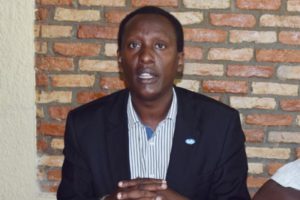 “In reality, the regime only targets Pierre Claver Mbonimpa, Pacifique Nininahazwe, Armel Niyongere and Vital Nshimirimana”, says the chairman of FORSC.
“In reality, the regime only targets Pierre Claver Mbonimpa, Pacifique Nininahazwe, Armel Niyongere and Vital Nshimirimana”, says the chairman of FORSC.
For him, this is proof of the government’s resentment against civil society organizations that never accepted the violation of the Constitution and Arusha Agreement.
“Spare the rod and spoil the child,” said Venant Hamza Burikukiye, welcoming the cancellation and temporary suspension of these civil society organizations.
This was during a press conference on October 26 by the collective of associations of people infected and affected by HIV / AIDS (CAPES +) and the Integral Platform of Burundian Civil Society (PISC-Burundi). For both organizations, which also applauded the government’s decision to withdraw from ICC, if the latter had really wished to dispense justice to the people of Burundi, it would have referred to serious human rights violations and crimes against humanity and violations of democracy during the “insurrection.”
“These ministerial ordinances are only the latest illustrations of a long series of attacks on freedom of expression and association targeting Burundian human rights defenders. They generally fall within the repressive and unprecedented spiral that struck Burundian civil society for a year and half, “lamented Dimitris Christopoulos, president of FIDH, global movement of Human Rights.
“These NGOs are actually targeted because they raise the awareness of the international community on the responsibility of the Burundian government for the crisis that the country is currently facing,” said Gerald Staberock, Secretary General of OMCT- the center in charge of protecting defenders of human rights (FIDH-OMCT partnership). He added that the ministerial ordinance of the 24th October is particularly arbitrary and unfounded given that some listed “organizations”, including SOS-Torture / Burundi, are only voluntary initiatives created by human rights defenders in exile, which didn’t even request approval from the ministry.
For Carina Tertsakian, senior researcher for Human Rights Watch, Africa Division, “The message is now clear: if you antagonize us, you will suffer the consequences.”By striking off these organizations, she noted, the government has made clear its intentions: It wants human rights violations perpetrated in Burundi to remain unnoticed. “But the more the government tries to cover up the crimes, the more the desire is great for human rights defenders to disclose them. Silencing the truth is not easy”.
Civil Society Organizations in a political wilderness…
Three days after the start of protests, the public prosecutor set up a commission to investigate “the insurgency sparked off on the 26 April 2015.” It was tasked to conduct a judicial inquiry into this movement to identify its authors and the responsibility of each one to finally bring them to justice.
The report of the commission made public on 20 November 2015 concluded that civil society organizations have taken the lead in this insurgency. A criminal file, RMPG 696 / MA, has been opened to find the perpetrators of these offenses.
The Commission has also calculated the damage caused by the dispute: BIF 51, 138, 872, 956. This assessment is provisional because human damage is not assessed.
He concluded: “These barbaric acts constitute various offenses. These crimes were committed by the same authors without a final conviction for any offense for at least one of them.
This movement includes facts which constitute separate offenses (murder, malicious destruction, grievous bodily harm, illegal detention of firearms, etc.) and are united together as arising from a single criminal intent. It is an ideal contest of offenses. ”
The commission equally made a list of civil society leaders who are accused of having participated in the movement called “insurgency”.
An inevitable end…
On 19 November 2015, the Attorney General of the Republic of Burundi wrote a letter No. 552/10/699 / BV / 2015 to all financial institutions to suspend any sort of withdrawal from the accounts of FORSC, FOCODE, ACAT , APRODH, RCP, AMINA, Fontaine Isoko, SPPDF. He added the personal accounts of Pacific Nininahazwe Vital Nshimirimana and Armel Niyongere leaders of the campaign “Halt to the third term of Pierre Nkurunziza”. The accounts have been closed without any form of trial.
Four days later, on 23 November 2015, Pascal Barandagiye, Minister of Interior, signed Ordinance No. 530/1597 suspending temporarily the activities of some nonprofit associations.
In his motivations, he based his judgment on the criminal file RMPG 696 / MA opened by the Attorney General of the Republic of Burundi. The aforesaid ordinance states that the action is taken to preserve order and security throughout the country.
Other associations that have not been suspended had their accounts closed. They are Ligue Iteka, AJCB, STEB union, OAG and BIRATURABA association.
Some suspended organizations have been allowed to operate again after being heard by the deputy public prosecutor of the Republic, Adolphe Manirakiza. They are AJCB and PARCEM. The decision to close the accounts of STEB Union has also been cancelled. We know what followed. (* The Network of Honest Citizen-RCP in October 2016, Burundi: With the third term, all means are good to close the civic space).
Analysis
“Do what the law allows you and stop manipulating the population … The law on associations and civil society will change to reframe the prerogatives of these associations which identify themselves as a civil society”. In his inauguration speech on the 20th August, 2015, President Pierre Nkurunziza already announced the fate of some civil society. At that time, they were accused of being more involved in politics than performing tasks provided by their statutes. Suspended first and their accounts (including some of their leaders) frozen, it was unlikely that these organizations could work again in Burundi during the current regime. Indeed, having participated in the campaign “Halt to the third term” was a godsend for Bujumbura regime, that considered the demonstrations staged by this campaign as “an insurrectionary movement “which later on was involved in the failed coup attempt of May 13, 2015. First insurgents, some leaders of these organizations today pointed the finger at by the government have equally become complicit in the coup. International arrest warrants followed, and the very persons were recurrent in official speeches.
On social networks, they became the number one public enemy of Burundi for government supporters.
At the same time, these “public enemies” didn’t fold their arms and regularly denounced abuses by the regime through regular reports or testimonies in interviews or surveys. At the last Arusha meeting for the inter-Burundian dialogue, the governmental delegation was out of the room because Pacifique Nininahazwe and Niyongere Armel were there.
The cancellation of these organizations did not come out of the blue. However, the reasons given by Bujumbura are not convincing. The leaders of these organizations are a thorn in the side of the government, of which they have been denouncing shortcomings since a long time. It is probably a reality that these organizations are involved too much in politics, but suspending or striking them off is not surely the best solution. It is an act that could tarnish the image of Burundi to those who welcome the accusations of these organizations. But for a regime that has just suspended cooperation with the UN High Commission for Human Rights and withdrawn from ICC in less than a month, this should not be a concern.


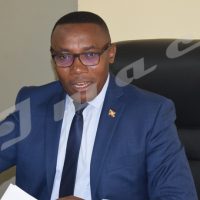
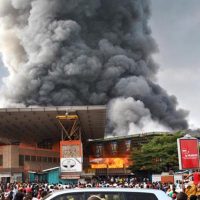
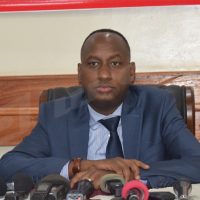














 IWACU Open Data
IWACU Open Data

